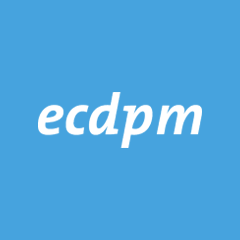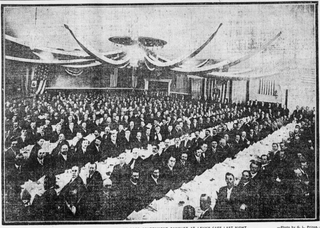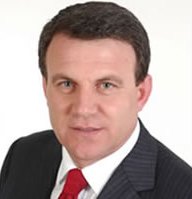
A think tank, or policy institute, is a research institute that performs research and advocacy concerning topics such as social policy, political strategy, economics, military, technology, and culture. Most think tanks are non-governmental organizations, but some are semi-autonomous agencies within government, and some are associated with particular political parties, businesses or the military. Think tanks are often funded by individual donations, with many also accepting government grants.
Good governance is the process of measuring how public institutions conduct public affairs and manage public resources and guarantee the realization of human rights in a manner essentially free of abuse and corruption and with due regard for the rule of law. Governance is "the process of decision-making and the process by which decisions are implemented ". Governance in this context can apply to corporate, international, national, or local governance as well as the interactions between other sectors of society.
Governance is the process of making and enforcing decisions within an organization or society. It encompasses decision-making, rule-setting, and enforcement mechanisms to guide the functioning of an organization or society. Effective governance is essential for maintaining order, achieving objectives, and addressing the needs of the community or members within the organization. Furthermore, effective governance promotes transparency, fosters trust among stakeholders, and adapts to changing circumstances, ensuring the organization or society remains responsive and resilient in achieving its goals. It is the process of interactions through the laws, social norms, power or language as structured in communication of an organized society over a social system. It is done by the government of a state, by a market, or by a network. It is the process of choosing the right course among the actors involved in a collective problem that leads to the creation, reinforcement, or reproduction of acceptable conduct and social order". In lay terms, it could be described as the processes that exist in and between formal institutions.

Globalization and Its Discontents is a book published in 2002 by the 2001 Nobel laureate Joseph E. Stiglitz. The title is a reference to Freud's Civilization and Its Discontents.

Rehman Sobhan is a Bangladeshi economist. Regarded as one of the country's top public thinkers, he is the founder of the Centre for Policy Dialogue. Sobhan is an icon of the Bangladeshi independence movement due to his role as a spokesman of the Provisional Government of Bangladesh in the United States during the Bangladesh Liberation War. He was awarded the Independence Day Award, Bangladesh's highest civilian honour, in 2008.
The Deutsche Gesellschaft für Internationale Zusammenarbeit (GIZ) GmbH, often simply shortened to GIZ, is the main German development agency. It is headquartered in Bonn and Eschborn and provides services in the field of international development cooperation and international education work. The organization's self-declared goal is to deliver effective solutions that offer people better prospects and sustainably improve their living conditions.

The European Centre for Development Policy Management, more commonly known as ECDPM, is a think tank founded in 1986. It is headquartered in Maastricht, Netherlands and has a second office in Brussels, Belgium.
The Maryland School of Public Policy is one of 14 schools at the University of Maryland, College Park. The school is located inside the Capital Beltway and ranks 16th nationally for schools of public policy according to U.S. News & World Report (2012).
The Lee Kuan Yew School of Public Policy is an autonomous postgraduate school of the National University of Singapore (NUS), named after the late former Prime Minister of Singapore, Lee Kuan Yew.
Daniel Kaufmann is the president emeritus of the Natural Resource Governance Institute (NRGI), which resulted from the merger of the Revenue Watch Institute – Natural Resource Charter. He is also a nonresident senior fellow at the Brookings Institution, where he was previously a senior fellow, and until July 2019 served in the international board of the Extractive Industries Transparency Initiative and in a number of advisory boards on governance, anti-corruption and natural resources and has also been in high-level expert commissions such as at the Organisation for Economic Co-operation and Development, the Inter-American Development Bank and the Mo Ibrahim Foundation. Prior to that, he was a director at the World Bank Institute, leading work on governance and anti-corruption. He was also a senior manager and lead economist at the World Bank, writing and working on many countries around the world, and was a visiting scholar at Harvard University. He has also served in other boards and councils in the past, including at the World Economic Forum.

The United States has a history of citizen, nonprofit, and other non-partisan groups advocating good government that reaches back to the late-19th-century municipal-level Progressive Movement and the development of governmental professional associations in the early part of the 20th century, such as the American Public Human Services Association and the International City/County Management Association. Many of these groups had their genesis at the Public Administration Center at 1313 East 60th Street, at the University of Chicago.
Center for Economic and Social Development, or CESD; in Azeri, İqtisadi və Sosial İnkişaf Mərkəzi (İSİM) is an Azeri think tank, non-profit organization, NGO based in Baku, Azerbaijan. The Center was established in 2005.

Arben Malaj has been Minister of Finance and Economy in the Republic of Albania different times from 1997 until 2005. He is known for transforming the Albanian economy into a European profile, after the hard social-economic crisis that this country passed during the year 1997. He served as a Member of the Albanian Parliament from 1997 to 2013 chairing the Parliamentary Committee on Economy and Finance.
The International Centre for Policy Studies (ICPS) is an independent NGO, founded in 1994 which aims to promote public policy concepts and practice and apply them to influential policy research that affects both the public and private sectors in Ukraine.
Multistakeholder governance is a practice of governance that employs bringing multiple stakeholders together to participate in dialogue, decision making, and implementation of responses to jointly perceived problems. The principle behind such a structure is that if enough input is provided by multiple types of actors involved in a question, the eventual consensual decision gains more legitimacy, and can be more effectively implemented than a traditional state-based response. While the evolution of multistakeholder governance is occurring principally at the international level, public-private partnerships (PPPs) are domestic analogues.

Erik Berglöf is a Swedish economist, currently the Chief Economist of the Asian Infrastructure Investment Bank (AIIB), the Beijing-based multilateral development bank established in 2016 with a mission to improve social and economic outcomes in Asia. In March 2019 Erik Berglöf was appointed to the European Council's High Level Group of Wise Persons on the European financial architecture for development where Berglöf and eight other economists will suggest changes to the EU's development finance structure. In 2017–2018 Erik Berglöf served on the secretariat of the G20 Eminent Persons Group on Global Financial Governance and on the Governing Board of the Institute for New Economic Thinking in New York.

The Institute for Development of Freedom of Information (IDFI) - is a Georgian non-governmental organization which tends to support the development of an informed and empowered society for democratic governance. IDFI promotes human rights and good governance by raising civic awareness through sound informational reports, research and recommendations; Advocates for initiating & implementing reforms of policies, laws and practices to enhance democratic governance.
Established in September 2005, the Institute for Governance of Private and Public Organizations (IGOPP) is a Canadian think tank and joint initiative of HEC Montréal and Concordia University and the Jarislowsky Foundation. The Institute is committed to promoting strong corporate governance practices among organizations in Quebec and the rest of Canada.
The Alliance for the Albanians is a centre-right political party founded in 2015 in North Macedonia by Ziadin Sela.









